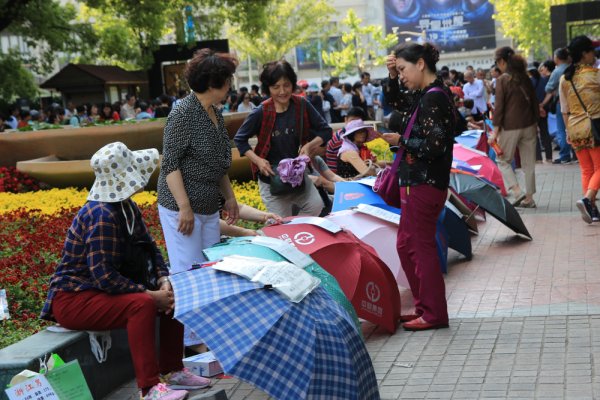On a crisp Sunday morning in the Chinese city of Xi’an, matchmaker Wang sets up her wares for the first time since the COVID-19 lockdown was lifted two months ago.
While not expecting many customers, Wang was surprised by the end of the day at how many parents came seeking her services.
Parents in their fifties and sixties have returned to continue their conversations and complaints about their children’s unwillingness to marry.
The matchmaking corner at Revolution Park is well known to locals. It is held every Wednesday and Sunday and is a site devoted to matching unmarried women and men.

A house and car are usually essential items in a marriage deal.
Few parents admit that they actually believe in this method of matchmaking and the success rate is incredibly low.
Parents seemingly attend the park because they see it as a way of fulfilling their parental duties, and also possibly because it is an opportunity to voice and discuss their dissatisfactions – about their unmarried children, what they see as the excessive demands of other parents, and what many perceive as a ‘crisis’ of marriage in China.
For the older generation, marriage is still considered the bedrock of Chinese society. But younger people are increasingly deferring marriage and more marriages are ending in divorce, which is a worrying and incomprehensible trend for many of China’s older generation.
Rapid economic and social changes in China have resulted in a particularly pronounced generation gap.
Rapid economic and social changes in China have resulted in a particularly pronounced generation gap.
The post-80s generation have far greater choice available to them due to steady economic growth and a growing consumer culture. This has influenced how young people define marriage and what they are looking for in a partner.
The matchmaking corner is always humming with activity and energy. Scores of parents can be heard chanting the same questions: “Son or daughter?”; “What year?”; “How tall?”.
The key feature of the matchmaking corner is the thousands of posters that are strung up between tree trunks, stapled to bushes, and stuck on tree branches. These posters are either written by a matchmaker or a parent and contain the personal details of an unmarried woman or man.
Prerequisites … generally emphasise specific criteria such as minimum height, income, and education, to the exclusion of all those who do not qualify.
Prerequisites listed in the posters generally emphasise specific criteria such as minimum height, income, and education, to the exclusion of all those who do not qualify.
Upon inspecting the posters, parents regularly chide each other for their ‘excessive’ demands in a daughter or son-in-law. By emphasising the irrational and unfair demands of some, parents are able to deflect responsibility away from their child’s perceived shortcomings to the marriage market as a whole.
There is also a sense of distrust on the part of attendees towards the information about the singles in the posters. Many are wary of false claims over age or even marital status.
Visitors to the park decried the tactics of parents who try to disguise the stigma of divorce by describing their child’s marital status as ‘briefly married’, instead of ‘divorced’.

Matchmaking is often to do with being seen to be a ‘good parent’.
The matchmaking corner is a place of public performance of ‘good parenting’ and is an extension of the dedication parents have exhibited throughout their child’s life.
Mr Ye has been attending the matchmaking corner for years, searching for a wife for his 45-year-old son.
During this time, he has found a few possible matches, but says his son is never satisfied. Despite this, he considers it is his duty as a parent to take on this matter and he was committed until the situation had been resolved.
I heard comments like this from parents every time I visited the matchmaking corner.
At matchmaker tables, parents enjoyed telling others how important their role was in ‘helping’ their child find a suitable partner and how much their children appreciated their assistance.
This rhetoric of noble parental duty was regularly invoked by parents to justify their visits to the park.
This rhetoric of noble parental duty was regularly invoked by parents to justify their visits to the park.
Women are often blamed for the marriage ‘crisis’, scapegoated for what many see as their excessive expectations of a future husband. This is a topic of conversation that unites many parents who frequent the corner.

Traditional expectations to marriage have been disrupted by a changing society.
During one visit, I was privy to one such debate.
The mother of an unmarried 32-year-old man, lead the discussion, drawing a small crowd.
As it grew in numbers, her tone of voice changed, her mannerisms grew more exaggerated, and her language more evocative. The people huddled around us also became increasingly animated, nodding their heads furiously and shouting in agreement.
A seat at a matchmaker’s table is another chance to vent the sense of precarity gripping many parents.
One afternoon, as I sat with matchmaker Wang, a woman stopped by her table to discuss her son, a recently-divorced taxi driver aged 33. He had been married for only two years and was childless.
The sadness she felt about her son’s situation was visceral, but even more so the fury directed at her former daughter-in-law.
The likelihood of her divorced son remarrying was at the forefront of the conversation, yet there was little reassurance Wang could provide.
We all knew that, for a divorcee, re-marriage would be tough.
This woman was not seeking reassurance – instead it seemed the sole purpose of the conversation was to seek comfort for, and to vent rage at the dissolution of her son’s marriage.
The matchmaking corner is an opportunity to air these frustrations with other like-minded individuals, ultimately offering parents a degree of consolation.
The matchmaking corner is a manifestation of a public outpouring of emotion in reaction to the rapid changes occurring in contemporary Chinese society.
In this way, the matchmaking corner is a manifestation of a public outpouring of emotion in reaction to the rapid changes occurring in contemporary Chinese society.
The emotional release that matchmaking corners provide helps soothe the gaping contradiction in the parents’ hierarchies of social acceptability.
Indeed, as an outlet for the emotional needs of parents, and also a collective debate, the matchmaking corner is a place for the older generation to manage the social and psychological contradictions that confront many parents in China today.
A long version of this article was originally published in the Melbourne Asia Review at the Asia Institute, University of Melbourne. It it republished under Creative Commons.




